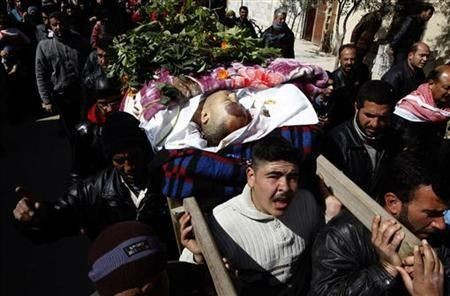Syria Loses over 7,500 Civilians to Azzad's Forces: Assad a War Criminal?

Syrian President Bashar al-Assad could be classified as a war criminal, U.S. Secretary of State Hillary Clinton said as the United Nations announced more than 7,500 civilians had been killed by his forces since the start of the revolt.
Syria
At least 25 people were killed in the shelling of opposition strongholds by Syrian forces on Tuesday, activists said. In Homs alone, opposition groups said hundreds of civilians had been killed or wounded in the 24-day-old assault.
As world dismay grew over the bloodshed, France said the Security Council was working on a new Syria resolution and urged Russia and China not to veto it, as they have previous drafts.
An outline drafted by Washington focused on the humanitarian situation in order to try to win Chinese and Russian support and isolate Assad, Western envoys said. But they said the draft would also suggest Assad was to blame for the crisis, a stance Russia in particular has opposed.
In the besieged district of Baba Amro and other parts of Homs, terrified residents were enduring dire conditions, without proper supplies of water, food and medicine, activists said.
A wounded British photographer managed to escape from Homs, but the fate of French reporter Edith Bouvier was not clear.
There are credible reports that the death toll now often exceeds 100 civilians a day, including many women and children, U.N. Under-Secretary-General for political affairs Lynn Pascoe told the U.N. Security Council. The total killed so far is certainly well over 7,500 people.
Syria's government said in December that armed terrorist groups had killed more than 2,000 soldiers and police.
Asked by a U.S. senator whether Assad could be called a war criminal, Clinton told a Senate hearing: There would be an argument to be made that he would fit into that category. She added, however, that using such labels limits options to persuade leaders to step down from power.
Russia and China vetoed a draft resolution on February 4 that would have backed an Arab League call for Assad to step down. China indicated a possible shift late on Tuesday when it told the head of the Arab League it supported international efforts to send humanitarian aid to Syria.
But Chinese Foreign Minister Yang Jiechi also urged political dialogue in Syria, something ruled out by his opponents, and Russia has warned against interference in Syria's affairs under a humanitarian guise.
Syria's U.N. ambassador in Geneva, Faysal Khabbaz Hamoui, stormed out of the U.N. Human Rights Council after calling on countries to stop inciting sectarianism and providing arms to Syrian rebels.
He said foreign sanctions were preventing Damascus from buying medicines and fuel. The European Union imposed additional punitive measures on Tuesday.
FRENCH JOURNALIST
British photographer Paul Conroy, of London's Sunday Times, was spirited safely out of Homs into Lebanon. He is in good shape and in good spirits, the newspaper said.
Conroy had been among several foreign journalists trapped in Baba Amro, where Marie Colvin, a veteran war correspondent also with the Sunday Times, and French photographer Remi Ochlik were killed in a bombardment on February 22.
Confusion surrounded Bouvier's fate. President Nicolas Sarkozy initially said he had been informed that Bouvier had been evacuated, but later said that had not been confirmed.
The latest bombardment of Baba Amro was the heaviest so far, activists said, adding tanks from an elite armoured division led by Assad's brother Maher had moved into Homs overnight.
The Syrian Observatory for Human Rights said at least 16 people were killed in Homs on Tuesday, a day after 84 were killed in the city, out of an overall death toll of 122 civilians across Syria. The British-based group said 29 security force members had been killed in clashes with rebels on Monday.
In Hama province, security forces bombarded the town of Helfaya, a centre of anti-Assad protests, killing 20 people.
The reports could not be independently confirmed. Syrian authorities tightly restrict media access to the country.
The International Committee of the Red Cross said it had delivered food and other aid to Homs and Idlib, but called for a humanitarian ceasefire to improve access.
Assad, projecting an aura of normality in a land ravaged by conflict over his right to power, promulgated a new constitution on Tuesday after officials said nearly 90 percent of voters had endorsed it in a referendum two days earlier. Opposition groups and Western leaders seeking his removal denounced it as a sham.
© Copyright Thomson Reuters 2024. All rights reserved.





















